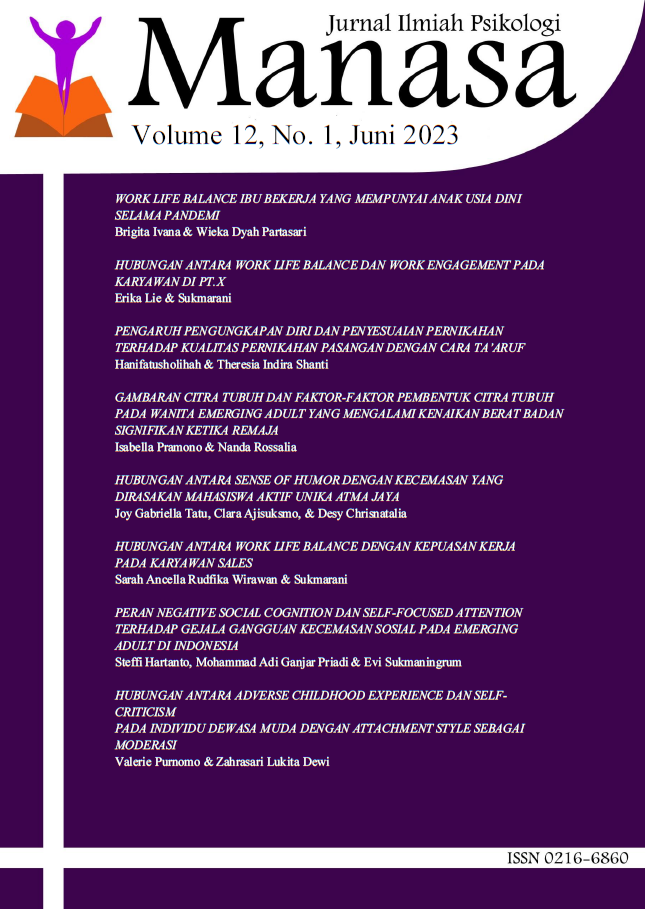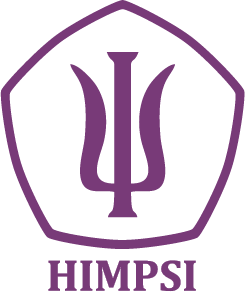WORK LIFE BALANCE IBU BEKERJA YANG MEMPUNYAI ANAK USIA DINI SELAMA PANDEMI
DOI:
https://doi.org/10.25170/manasa.v12i1.4448Keywords:
Work life balance, working mother, early childhood, work from home, pandemicAbstract
The aim of this research is to see working mother’s work life balance with early childhood children
during work from home era due to the COVID-19 pandemic. This research uses a qualitative
phenomenological method with semi-structured interviews and thematic analysis. Participants
consisted of 3 working mothers that have a child or children around 3-5 years old, work in a
company owned by another party at least 40 hours a week, and currently doing work from home.
Participants were chosen using purposeful sampling homogeneous method. Analysis shows
different levels of work life balance between all three participants, and only one of them experience
work life balance. These differences influenced by factors such as participant’s career aspiration,
types of job, support from partner and family, as well as the partner’s type of work. The
recommendation for future research is to look for the impact of partner’s type of work to the
intensity of parenting task distribution. Future research can also look for the impact of career
aspiration to working mother’s satisfaction and work life balance. In an era where remote work
is increasingly common, this research is expected to provide an overview of how working mothers
divide their roles, so that companies can make policies based on this situation. The research is
also expected to be useful for career women who are not married or do not have children yet to be
able to plan a more mature future with their partner, both in the context of role division and mental
readiness.
References
Andriany, A. R., Pratiwi, A. M. A., & Pertiwi, M. (2020). Hubungan stres kerja dengan burnout pada pekerja wanita yang melakukan work from home di masa pandemi COVID-19. Human behavior in the new normal post-pandemic: Challenges and opportunities for psychology in the archipelago (38-47). Udayana Press. http://repository.ubharajaya.ac.id/11000/1/Proceeding%20KPIN.pdf#page=47
Avilla, G. (2017). Gaya kepemimpinan transformasional, keadilan organisasi, dan reaksi karyawan terhadap kinerja karyawan. Jurnal manajemen dan pemasaran jasa, 10(1), 129-140. http://dx.doi.org/10.25105/jmpj.v10i1.1670
Badan Pusat Statistik. (n.d.). Tenaga kerja. https://www.bps.go.id/subject/6/tenaga-kerja.html
Creswell, J. W. (2012). Educational research: Planning, conducting and evaluating quantitative and qualitative research (4th ed.). Pearson Education.
Fisher, G. G. (2001). Work/personal life balance: A construct development study [Doctoral dissertation, Bowling Green State University]. https://www.proquest.com/openview/baa22a6a02edbe6b36b8cf143382e475/1?pq-origsite=gscholar&cbl=18750&diss=y
Fitriyani, Nurwati, N., & Humaedi, S. (2016). Peran ibu yang bekerja dalam pemenuhan kebutuhan dasar anak. Prosiding KS: Riset & PKM, 3(1) 52-57. https://doi.org/10.24198/jppm.v3i1.13626
Greenhaus, J. H. & Allen, T. D. (2011). Work-family balance: A review and extension of the literature. In Quick, J. C. & Tetrick, L. E. (Ed.), Handbook of occupational health psychology (2nd ed., 165-193). American Psychology Association. https://www.researchgate.net/publication/259280583_Work-Family_Balance_A_Review_and_Extension_of_the_Literature
Greenhaus, J. H. & Beutell, N. J. (1985). Source of conflict between work and family roles. Academy of management review, 10(1) 76-88. https://www.researchgate.net/publication/259309989_Source_of_Conflict_Between_Work_and_Family_Roles
Greenhaus, J. H. & Callanan, G. A. (Ed.). (2006). Encyclopedia of career development. SAGE Publication, Inc. https://lib.atmajaya.ac.id/default.aspx?tabID=61&src=k&id=157188
Greenhaus, J. H., Collins, K. M., & Shaw, J. D. (2002). The relation between work-family balance and quality of life. Journal of vocational behavior, 63, 510-531. DOI:10.1016/S0001-8791(02)00042-8
Gunarsa, Y. S. D. (2000). Asas-asas psikologi keluarga idaman. PT BPK Gunung Mulia. https://books.google.co.id/books?id=DLZZoVT7eFMC&pg=PA17&hl=id&source=gbs_toc_r&cad=3#v=onepage&q&f=false
Handayani, D. S., Sulastri, A., Mariha, T., & Nurhaeni, N. (2017). Penyimpangan tumbuh kembang pada anak dari orang tua yang bekerja. Jurnal keperawatan indonesia, 20(1), 48-55. https://media.neliti.com/media/publications/105888-ID-penyimpangan-tumbuh-kembang-anak-dengan.pdf
Hurlock, E. B. (1991). Psikologi perkembangan: Suatu pendekatan sepanjang rentang kehidupan (5th ed.). Erlangga.
Huuhtanen, P. (1997). The health and safety issues for teleworkers in the european union. European foundation for the improvement of living and working conditions. https://webs.ucm.es/info/seas/estres_lab/informes/Informe%20europeo%20Health%20&%20Safety%20Issues%20for%20Teleworkers.pdf
Kementerian Pemberdayaan Perempuan dan Perlindungan Anak Republik Indonesia. (2021). Profil perempuan indonesia tahun 2020. https://www.kemenpppa.go.id/index.php/page/read/26/3057/profil-perempuan-indonesia-tahun-2020
Kurniati, E., Alfaeni, D. K. N., & Andriani, F. (2021). Analisis peran orang tua dalam mendampingi anak di masa pandemi covid-19. Jurnal obsesi: Jurnal pendidikan anak usia dini, 5(1), 241-256. https://obsesi.or.id/index.php/obsesi/article/view/541/pdf
Leshan, E. (1981). The working mother. In Sumanullang, N. (Ed), The working mother. Lembaga Bahasa Unika Atma Jaya. https://lib.atmajaya.ac.id/default.aspx?tabID=61&src=k&id=42781
Limilia, P. & Prasanti, D. (2016). Representasi ibu bekerja vs ibu rumah tangga di media online: Analisis wacana pada situs kompasiana.com. Jurnal ilmiah kajian gender, 6(2), 133-154). https://www.researchgate.net/publication/318655775_REPRESENTASI_IBU_BEKERJA_VS_IBU_RUMAH_TANGGA_DI_MEDIA_ONLINE_Analisis_Wacana_pada_Situs_KompasianaCom
Marliani, R., Nasrudin, E., Rahmawati, R., & Ramdani, Z. (2020). Regulasi emosi, stres, dan kesejahteraan psikologis: Studi pada ibu work from home dalam menghadapi pandemi COVID-19. Researchgate. https://www.researchgate.net/publication/341150701_Regulasi_Emosi_Stres_dan_Kesejahteraan_Psikologis_Studi_Pada_Ibu_Work_From_Home
Mas’udi, W. & Winanti, P. (Ed.). (2020) Tata kelola penanganan COVID-19 di indonesia: Kajian awal. Gadjah Mada University Press. https://lib.atmajaya.ac.id/default.aspx?tabID=61&src=k&id=237102
Matlin, M. W. (2011). The psychology of women (7th ed.). Wadsworth Cengage Learning. https://books.google.co.id/books?hl=en&lr=&id=HToJAAAAQBAJ&oi=fnd&pg=PR5&dq=matlin&ots=xtRswp07Ef&sig=S7AewNvqgnP0m3Vzlcd6if601xQ&redir_esc=y#v=onepage&q=matlin&f=false
Menteri Dalam Negeri Republik Indonesia. (2021). Pemberlakuan Pembatasan Kegiatan Masyarakat Darurat Corona Virus Disease 2019 di WIlayah Jawa dan Bali. https://covid19.go.id/storage/app/media/Regulasi/2021/Juli/INMENDAGRI%20NO%2015%20TAHUN%202021%20TENTANG%20PPKM%20DARURAT.pdf
Mungkasa, O. (2020). Bekerja dari rumah (work from home): Menuju tatanan baru era pandemi COVID-19. Jurnal Badan Perencanaan Pembangunan Nasional, 126-150. https://journal.bappenas.go.id/index.php/jpp/article/view/119/81
Naomee, I. (2013). Role of families on early childhood development and education: Dhaka city perspective. The international journal of social sciences, 11(1), 158-169. https://www.academia.edu/3624185/ROLE_OF_FAMILIES_ON_EARLY_CHILDHOOD_DEVELOPMENT_AND_EDUCATION_DHAKA_CITY_PERSPECTIVE
Pandia, W. S. S. (2011) Aspirasi akademik dan karier perempuan: Apakah terkait dengan perbedaan kemampuan dan motivasi antara perempuan dan laki-laki?. In Nurrachman, N. & Bachtiar, I. (Ed), Psikologi perempuan: Pendekatan kontekstual indonesia. Penerbit Universitas Atma Jaya. https://lib.atmajaya.ac.id/Uploads/Fulltext/174601/Nani%20NUrachman%20-%20Psikologi%20Perempuan%20optimize.pdf
Pangesti, C. B., & Agussafutri, W. D. (2017). Hubungan peran ibu dengan konsep diri anak usia 3-5 tahun. Jurnal kesehatan kusuma husada, 160-165. http://download.garuda.ristekdikti.go.id/article.php?article=535407&val=5479&title=HUBUNGAN%20PERAN%20IBU%20DENGAN%20KONSEP%20DIRI%20ANAK%20USIA%203-5%20TAHUN
Poulose, S. & Sudarsan, N. (2014). Work life balance: A conceptual review. International journal of advances in management and economics, 3(2) 1-17. http://www.managementjournal.info/index.php/IJAME/article/view/324
Ramadhani, D. Y. (2019). Perkembangan anak usia prasekolah yang diasuh oleh ibu bekerja dan tidak bekerja. Jurnal ilmu keperawatan dan kebidanan, 11(1), 35-40. http://download.garuda.ristekdikti.go.id/article.php?article=1196391&val=8606&title=PERKEMBANGAN%20ANAK%20USIA%20PRASEKOLAH%20YANG%20DIASUH%20OLEH%20IBU%20BEKERJA%20DAN%20TIDAK%20BEKERJA
Robbins, S. & Judge, T. (2013). Organizational behavior (15th ed.). Pearson.
Santrock, J. W. (2012). Life-span development (14th ed.). McGraw-Hill.
Syahrul, F. F., Fidesrinur, & Firmiana, M. E. (2011). Motif keterlibatan kaum ibu dalam pendidikan anak usia dini di jakarta barat. Jurnal al-azhar indonesia seri humaniora, 1(1), 44-50. https://media.neliti.com/media/publications/290074-motif-keterlibatan-kaum-ibu-dalam-pendid-4701a0b7.pdf
Undang-Undang Republik Indonesia Nomor 13, 20 (2003). https://www.kemenperin.go.id/kompetensi/UU_13_2003.pdf
Utaminingsih, A. (2017). Gender dan wanita karir. UB Press.
Vyas, L., & Butakhieo, N. (2020). The impact of working from home during COVID-19 on work and life domains: An exploratory study on hong kong. Policy design and practice, 4(1), 59-76. https://www.tandfonline.com/doi/full/10.1080/25741292.2020.1863560
Wattis, L., Standing, K., & Yerkes, M. (2013). Mothers and work-life balance: Exploring the contradiction and complexities involved in work-family negotiation. Researchgate. https://www.researchgate.net/publication/263343534_Mothers_and_work-life_balance_Exploring_the_contradictions_and_complexities_involved_in_work-family_negotiation
Wijayanto, A. Y. & Fauziah, N. (2018). Kerja di genggamanku keluarga di hatiku: Interpretative phenomenological analysis tentang work-family balance pada ibu bekerja. Jurnal empati, 7(1), 76-83. http://eprints.undip.ac.id/58171/1/Abstrak_Aditya_Yulyan_W_15010110141071_No._HP._082242281707.pdf
Willig, C. (2013). Introducing qualitative research in psychology (3rd ed.). McGraw-Hill.
Wulandari, B., Sholihah, K. U., Nabila, T., & Kaloeti, D. V. S. (2021). Subjective well-being in working mothers during the COVID-19 pandemic: A systematic literature review. Proceding of Inter-Islamic University Conference on Psychology, 1(2). https://press.umsida.ac.id/index.php/iiucp/article/view/602/431
Yin, R. K. (2016). Qualitative research from start to finish (2nd ed.). The Guilford Press.
Yulianingsih, W., Suhanadji, Nugroho, R., & Mustakim. (2021). Keterlibatan orangtua dalam pendampingan belajar anak selama masa pandemi covid-19. Jurnal obsesi: Jurnal pendidikan anak usia dini, 5(2), 1138-1150. https://obsesi.or.id/index.php/obsesi/article/view/740
Yustari, A. & Sari, J. D. E. (2020). Perbedaan tingkat kepuasan hidup ibu bekerja dan ibu rumah tangga: Studi pada ibu pkk desa kaliagung, kecamatan blimbingsari, kabupaten banyuwangi. Jurnal ikesma, 16(1), 1-6. https://doi.org/10.19184/ikesma.v16i1.14757
Downloads
Published
Issue
Section
License
Copyright (c) 2023 MANASA

This work is licensed under a Creative Commons Attribution-NonCommercial-ShareAlike 4.0 International License.









.png)
.png)

